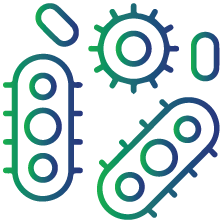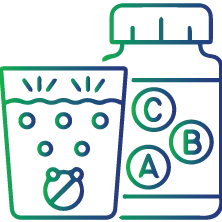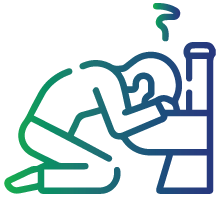
Complete Blood Count (CBC)/Hemogram Test
About CBC and Hemogram
A CBC Test (Complete Blood Count) and Haemogram Test are essential diagnostic tests used to measure various blood components. At Lupin Diagnostics, the CBC Test is one of the most frequently prescribed tests, helping individuals stay informed about their health. If you are checking for the Lupin Diagnostics CBC Test Price, you will find it both affordable and reliable, making it convenient to book CBC test online.
The CBC Test is a routine health check-up tool that helps detect infections, anaemia, immune system disorders, and blood cancers. The Haemogram Test includes the CBC Test and an Erythrocyte Sedimentation Rate (ESR), which provides additional insights. Erythrocytes are blood cells made in the bone marrow and circulated throughout the body. While the Haemogram Test includes ESR, the CBC Test does not.
A CBC/Haemogram Test is a comprehensive blood panel that evaluates red blood cells (RBC), white blood cells (WBC), and platelets (PLT). These blood cells play vital roles in immunity, oxygen transport, and clotting. Because of this, the test is crucial for diagnosing multiple conditions and monitoring how your body responds to treatments. Whether you are concerned about fatigue, recurrent infections, or nutritional deficiencies, booking a CBC Test online with Lupin Diagnostics is a reliable choice.
What is CBC/ Hemogram used for?
Doctors recommend a CBC Test or Haemogram Test for the diagnosis, screening, and monitoring of conditions such as:
- Anaemia
- Bone marrow and blood disorders (thalassemia, sickle cell disease)
- Blood cancers such as leukemia and lymphoma
- Infections
- Side effects of chemotherapy
- Vitamin and mineral deficiencies
With the accurate results and transparency of the Lupin Diagnostics CBC Test Price, patients can easily book CBC test online for timely health insights.
CBC/ Hemogram is used for the diagnosis, screening, and monitoring of conditions such as:

Anaemia

Bone marrow and blood disorders like thalassemias and sickle cell

Cancers like leukemia and lymphoma

Infections

Chemotherapy side effects

Vitamin and mineral deficiencies
Who should get tested?
A CBC/ Hemogram is recommended for individuals having the following symptoms

Bruising or bleeding

Dizziness

Fatigue

Fever

Vomiting/Nausea

Swelling and irritation anywhere in the body.

Joint pain

Heart problems
Test preparation
No special preparation is required before undergoing a CBC Test or Haemogram Test. Simply book your test online, visit the nearest Lupin Diagnostics centre, and get your results quickly at a transparent cost.
Interpretation of results
|
Parameters |
Normal blood counts |
|
RBC count (Male) |
4.7 to 6.1 million cells/mcL |
|
RBC count (Female) |
4.2 to 5.4 million cells/mcL |
|
WBC count |
4,500 to 10,000 cells/mcL |
|
Hematocrit (Male) |
40.7% to 50.3% |
|
Hematocrit (Female) |
36.1% to 44.3% |
|
Hemoglobin (Male) |
13.8 to 17.2 gm/dL |
|
Hemoglobin (Female) |
12.1 to 15.1 gm/dL |
|
MCV |
80 to 95 femtoliter |
|
MCH |
27 to 31 pg/cell |
|
MCHC |
32 to 36 gm/dL |
|
Platelet count |
150,000 to 450,000/dL |
Blood count ranges may vary slightly by lab. Abnormal values can indicate conditions like anaemia, heart disease, bone marrow disorders, immune problems, or infections.
Deviation from normal levels indicates the following:
· Abnormal levels of haemoglobin, haematocrit or RBCs can be signs of anaemia, heart disease, or iron deficiency.
· Low white blood cell count might be caused due to a bone marrow disorder, autoimmune disorder, or cancer.
· High white blood cell count may be because of an inflammation, infection, or a reaction to a medication.
FAQs
What is the turnaround time (TAT) for the results of a CBC/Haemogram Test?
At Lupin Diagnostics, the CBC Test and Haemogram Test are processed using advanced automated analyzers to ensure speed and precision. Results are typically available within 24–48 hours, though in rare cases, additional time may be needed. When you book CBC Test online, you can conveniently track your report status and download it once ready, giving you both speed and accessibility at a reliable CBC Test price.
What are the risks associated with CBC/ Hemogram test?
The CBC Test and Haemogram Test are safe, routine blood tests with very low risk. During sample collection, you may feel a mild sting when the needle is inserted. Slight bruising, tenderness, or swelling at the puncture site can occur but usually resolves quickly. Rarely, infection or fainting may occur. Lupin Diagnostics follows strict hygiene and safety protocols, ensuring your experience is comfortable and secure at an affordable CBC Test price.
What are the benefits of this CBC/ Hemogram test?
A CBC Test provides essential insights into your overall health by evaluating red blood cells, white blood cells, and platelets. It can detect conditions such as anaemia, infections, immune system disorders, clotting abnormalities, vitamin deficiencies, and even early signs of leukemia. The Haemogram Test, with ESR, goes further by helping to identify inflammatory conditions. By booking your CBC Test online at Lupin Diagnostics, you gain access to fast, accurate reports that help doctors diagnose, monitor, and adjust treatments, all at a clear and transparent cost.
Should I be concerned if my CBC/Hemogram test result is abnormal?
Abnormal values in a CBC Test or Haemogram Test are not always cause for alarm but should not be ignored. Low RBC or haemoglobin may suggest anaemia, while low WBC counts could indicate immune suppression. High WBC counts often signal infection or inflammation. Platelet abnormalities may point to bleeding or clotting issues. Your doctor will interpret the report along with your symptoms and may order additional investigations. With Lupin Diagnostics, your CBC Test report comes with detailed reference ranges for easy understanding, and your doctor can guide you on next steps.
Can a CBC detect a heart problem?
The CBC Test is not a direct cardiac test but it can reveal blood-related factors linked to heart conditions. For example, anaemia can worsen heart disease by reducing oxygen supply to tissues, while chronic inflammation detected via elevated WBC counts may increase cardiovascular risk. Doctors often use the CBC/Haemogram Test along with lipid profiles and ECGs to assess overall heart health. Booking your CBC Test online with Lupin Diagnostics ensures reliable reports at a transparent CBC Test price.
How much does the Lupin Diagnostics CBC Test cost?
The Lupin Diagnostics CBC Test price is kept affordable and transparent so patients can access high-quality diagnostics without financial strain. The price may vary slightly depending on location or promotional offers. You can confirm the exact cost before scheduling by using the Lupin Diagnostics portal to book CBC Test online, ensuring you know the price upfront before visiting the center.
Is fasting required for a CBC/Haemogram Test?
No fasting is required for the CBC Test or Haemogram Test. These tests measure blood cell counts and ESR, which are not affected by meals. You can take the test at any time of the day, making it convenient to schedule. When you book CBC Test online with Lupin Diagnostics, you will receive clear instructions, but in general, you can eat and drink normally before your sample is collected.
How do I book a CBC/Haemogram Test online at Lupin Diagnostics?
Booking your CBC Test online with Lupin Diagnostics is quick and hassle-free. Simply visit the official Lupin Diagnostics website or app, search for CBC Test/Haemogram Test, check the CBC Test price, and select your preferred location. You can schedule a home sample collection or walk into the nearest Lupin Diagnostics center. Once done, your report will be available online within the standard turnaround time, giving you both convenience and confidence in your health monitoring.

